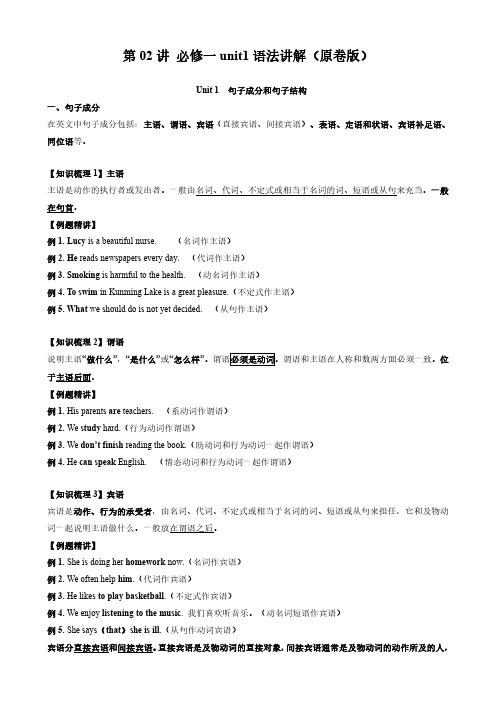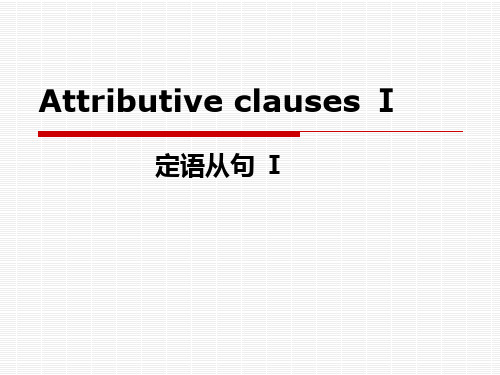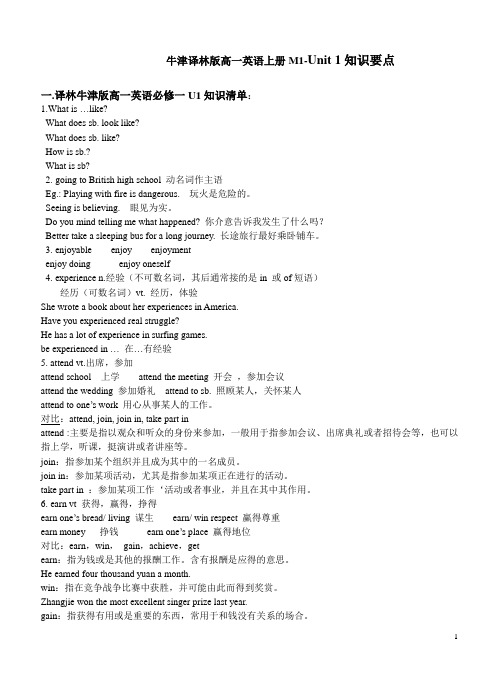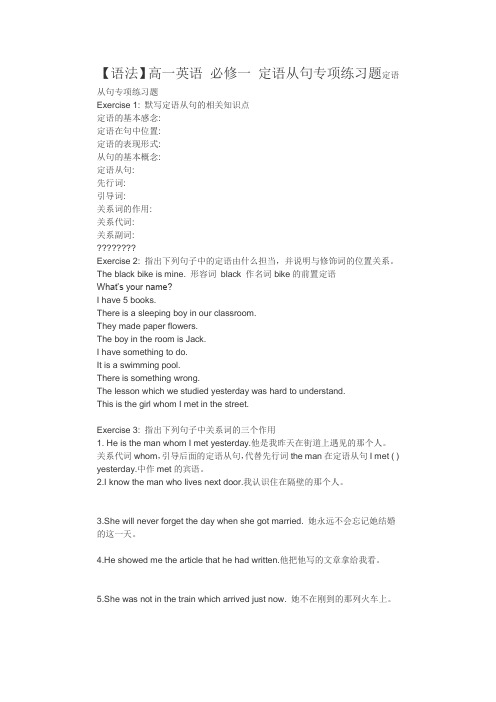高一英语(牛津译林版)必修一定语从句1
高一英语必修一unit4定语从句

Do you know the girl in our class? Her hair is very short. Do you know the girl whose hair is very short in our class? He is the student. I broke his pencil yesterday. He is the student whose pencil I broke yesterday.
refere
nce
(4) 先行词是who或which引导的主句。 Who is the girl that drove the car? Who that broke the window will be punished? Which is the T-shirt that fits me most? Who is the man that is reading the newspaper over there?
• Mr. Turner is an artist. • She became a lawyer.
主系表
主谓双宾 主谓双宾 主谓宾宾补
• He gave his sister a book.
• I'll write you a long letter.
• I found the book easy. • I'll let him go.
refere
nce
that和which在指物的情况下一般都 可以互换,但在下列情况下,一般用 that而不用which。
(1) 限制性定语从句中先行词为all, everything, anything, nothing, none, few, little, some等不定代词指物时。 (something用that或which均可) Have you taken down everything that Mr. Li said? There seems to be nothing that is impossible to him in the world.
第01讲 必修一unit1单词短语预习(解析版)新高一英语暑假衔接课(译林版2020)22

第02讲必修一unit1语法讲解(原卷版)Unit1句子成分和句子结构一、句子成分在英文中句子成分包括:主语、谓语、宾语(直接宾语、间接宾语)、表语、定语和状语、宾语补足语、同位语等。
【知识梳理1】主语主语是动作的执行者或发出者。
一般由名词、代词、不定式或相当于名词的词、短语或从句来充当。
一般在句首。
【例题精讲】例1.Lucy is a beautiful nurse.(名词作主语)例2.He reads newspapers every day.(代词作主语)例3.Smoking is harmful to the health.(动名词作主语)例4.To swim in Kunming Lake is a great pleasure.(不定式作主语)例5.What we should do is not yet decided.(从句作主语)【知识梳理2】谓语说明主语“做什么”,“是什么”或“怎么样”位于主语后面。
【例题精讲】例1.His parents are teachers.(系动词作谓语)例2.We study hard.(行为动词作谓语)例3.We don’t finish reading the book.(助动词和行为动词一起作谓语)例4.He can speak English.(情态动词和行为动词一起作谓语)【知识梳理3】宾语宾语是动作、行为的承受者,由名词、代词、不定式或相当于名词的词、短语或从句来担任,它和及物动词一起说明主语做什么。
一般放在谓语之后。
【例题精讲】例1.She is doing her homework now.(名词作宾语)例2.We often help him.(代词作宾语)例3.He likes to play basketball.(不定式作宾语)例4.We enjoy listening to the music.我们喜欢听音乐。
(动名词短语作宾语)例5.She says(that)she is ill.(从句作动词宾语)宾语分直接宾语和间接宾语。
高一英语必修一 Unit4 定语从句Attributive clauses Ⅰ

whose+n,
=the +n+of +which/whom,
=of +which/whom + the +n
4. Peter lives in the room ___ window opens to the south. A. whose B. that C. which D. of which 5. Please pass me the dictionary ___ the cover is black. A. of which B. which of C. its D. whose
Attributive clauses Ⅰ
定语从句 Ⅰ
一 概念
在英语中修饰n或 pron的成分称为定语,根据定语 出现在n或 pron前后在位置可以将其分为前置定语 和后置定语。 a developing country a kind father a girl in red a boy sleeping in class 一般而言,前置定语经常由单个词充当,而后置定语 则由短语或句子充当,当一个句子充当定语修饰前 面的n或 pron时,就被称为定语从句。
Combine the two sentences to one.
1 I like the girl. The girl lives next door.
I like the girl who/that lives next door. The girl whom/who/that I like lives next door.
3.
It is a poor dog. Its heart is broken. It is a poor dog whose heart is broken.
牛津译林版高一英语上册必修一Unit1知识要点总结

牛津译林版高一英语上册M1-Unit 1知识要点一.译林牛津版高一英语必修一U1知识清单:1.What is …like?What does sb. look like?What does sb. like?How is sb.?What is sb?2. going to British high school 动名词作主语Eg.: Playing with fire is dangerous. 玩火是危险的。
Seeing is believing. 眼见为实。
Do you mind telling me what happened? 你介意告诉我发生了什么吗?Better take a sleeping bus for a long journey. 长途旅行最好乘卧铺车。
3. enjoyable enjoy enjoymentenjoy doing enjoy oneself4. experience n.经验(不可数名词,其后通常接的是in 或of短语)经历(可数名词)vt. 经历,体验She wrote a book about her experiences in America.Have you experienced real struggle?He has a lot of experience in surfing games.be experienced in …在…有经验5. attend vt.出席,参加attend school 上学attend the meeting 开会,参加会议attend the wedding 参加婚礼attend to sb. 照顾某人,关怀某人attend to one’s work 用心从事某人的工作。
对比:attend, join, join in, take part inattend :主要是指以观众和听众的身份来参加,一般用于指参加会议、出席典礼或者招待会等,也可以指上学,听课,挺演讲或者讲座等。
【语法】高一英语 必修一 定语从句专项练习题定语

【语法】高一英语必修一定语从句专项练习题定语从句专项练习题Exercise 1: 默写定语从句的相关知识点定语的基本感念:定语在句中位置:定语的表现形式:从句的基本概念:定语从句:先行词:引导词:关系词的作用:关系代词:关系副词:????????Exercise 2: 指出下列句子中的定语由什么担当,并说明与修饰词的位置关系。
The black bike is mine. 形容词black 作名词bike的前置定语What’s your name?I have 5 books.There is a sleeping boy in our classroom.They made paper flowers.The boy in the room is Jack.I have something to do.It is a swimming pool.There is something wrong.The lesson which we studied yesterday was hard to understand.This is the girl whom I met in the street.Exercise 3: 指出下列句子中关系词的三个作用1. He is the man whom I met yesterday.他是我昨天在街道上遇见的那个人。
关系代词whom,引导后面的定语从句,代替先行词the man在定语从句I met ( ) yesterday.中作met的宾语。
2.I know the man who lives next door.我认识住在隔壁的那个人。
3.She will never forget the day when she got married. 她永远不会忘记她结婚的这一天。
4.He showed me the article that he had written.他把他写的文章拿给我看。
Unit 4 Grammar 讲义-2021-2022学年高一英语牛津译林版(2020)必修第一册

译林版必修第一册Unit4单元语法--关系副词引导的限制性定语从句语法精析当先行词在定语从句中作状语时,通常要用关系副词引导定语从句。
常用的关系副词有where,when,why等。
1.关系副词wherewhere引导的定语从句的先行词往往是表示地点的名词(如place,room,house,spot等),关系副词在从句中作地点状语。
常用in which,at which,on which等代替。
They are playing in the park where(=in which) there are some flowers.他们正在有花的公园里玩耍。
The office where(=at which) the girl works is not far from here.这个女孩工作的办公室离这儿不远。
[温馨提示]①有一些先行词,如point,stage,position,case,condition等,属于抽象的地点名词,如果定语从句中缺状语,需要接where引导的定语从句。
You reach a point in your project where you just want to get the thing f inished.从事任何项目你都会进入一种境界:一心想完成它。
We reached a stage where we had to answer violence with violence.我们陷入了必须用暴力来对抗暴力的境地。
②where引导定语从句和状语从句的区别:引导定语从句时,where是关系副词,在从句中作地点状语,其前有表示地点的名词作先行词,从句修饰先行词;引导状语从句时,where是从属连词,从句修饰主句的谓语动词,where前面没有表示地点的名词。
He’s got into a situation where he is likely to lose control over the plane.(定语从句)他陷入了一种很可能会失去对飞机的控制的境地。
高中英语必修一学案:定语从句
高一英语定语从句(2017.9.18)命题人高一英语组一、基本概念定语从句:在复合句中作定语,修饰名词或代词的从句叫定语从句。
先行词:被定语从句所修饰的名词或代词。
一般情况下,定语从句紧跟先行词。
但也有因各种原因定语从句与先行词被分割的现象。
关系代词:定语从句的引导词,紧跟先行词,并在定语从句中充当一个成分。
关系代词:who,whom,which,that和whose,关系代词在定语从句中充当主语、宾语、表语和定语。
二、关系代词的用法(一)基本用法根据先行词的不同,和在从句中所充当的成分不同,选用不同的关系代词。
注意:关系代词在定语从句中充当宾语时可以省略,充当主语时则不能。
一、用适当的关系代词填空__________1.This is the hero __________ we are pound of.这是我引以为荣的那个英雄。
______________________________2.This is the pen __________ I wrote the letter with. 这是我写信时用的钢笔。
__________3.Do you know the professor ________will five us a speech next week?4.I read a report about his new novel________will soon be published.5.The plan_______they argued about was settled at last.6.Rice is a plant________is grown in the south.7.China is a country_________has a long history.8.The cup _________is on the desk belongs to Tom.9.Yesterday I saw a beautiful dress_______you may like in that store.10.The man_________you saw in the library is called Smith.11.The woman________gave a speech on TV yesterday is our English teacher.12.This is the man________I mat in the park.二、改错1.Is this museum you visited a few days ago?2.The girl which is standing next to our teacher is her daughter.3.The cake you made it yesterday was very delicious.4.Do you know the man wrote the letter?5.The book you borrowed it from me is Tom’s.6.The house is built on soft land is easy to fall down.三、用定语从句合并下列句子1.This is the new secretary. I would introduce her to you.____________________________________________________________________________2.The train was late. It was going to Shanghai.____________________________________________________________________________ 3.The school is a big one. The school stands near the river._____________________________________________________________________________ 4.I will never forget the days. We spent the days together._____________________________________________________________________________ 5.My uncle bought the bike last week. The bike has been stolen._____________________________________________________________________________ 四、完成句子1.Wheat is a plant____________________________________.(中国北方种植的)2.This is the gentleman___________________________________.(眼睛失明的)3.He is not the man_________________________________.(原来的他)4.The girl ________________________________(正在会上发言的) is our monitor.5.Is this the book___________________________(你想要的)?6.He is the man____________________________(我正在找的人).7.The letter_________________________________(我昨天收到的)was from my aunt. (二)只用关系代词that的情况1.先行词是最高级形容词或它的前面有最高级形容词修饰时。
译林版高一英语必修第一册(2019版)_Unit1_词汇分层解析
Unit1 词汇分层解析I 重点短语make a difference 起作用,有影响课文原句:The possibilities are endless, and I have confidence in your ability to make a difference to your family, to your community and to your country. 可能性是无限的,我相信你们有能力对你们的家庭,你们的社区和捏们的国家产生影响。
拓展:make a/ some/ much/ no difference (to sb./ sth.) 有/一些/ 有许多/ 没有影响或作用It makes a difference (to sb. /sth. ) +wh-从句…(对某人/某物)关系重大,有影响例句:Small acts of kindness can make a great difference. 小善举能带来大影响。
Whether he is here or not will make no difference to our work. 他在不在这里对我们的工作没有影响。
It makes much difference what you choose. 你选择的东西事关重大。
It makes no difference to me whether he goes or not. 不管他去还是不去,对我都没影响。
take advantage of 利用课文原句:Take advantage of your classes, learn from your teachers and classmates, and make use of our school facilities. 利用你们的课堂,向老师和同学学习,并利用好我们学校的设施。
例句:I’m going to take advantage of this tour to explore the history of the castle. 我打算利用这次旅行来探究一下这座城堡的历史。
高必修一 U4 语法讲解:定语从句(关系代词)
2. I have seen some strange trees, _____ B open at sunrise and close at sunset. A. which the leaves B. whose leaves C. which leaves D. their leaves 3. All _____ we need is enough rest after B long hours’ work. A. the thing B. that C.ootball, _______ is a very interesting game, is popular all over the world. which 2. This is the house in _______ he once lived. 结论4: 只能用which,不能用that的情况: 1. 引导非限制性定语从句时。 2. 介词提前时。
结论1: 先行词还原代入后在从句中充当主语: 指人:who / that 指物: which / that 充当宾语: 指人who(m) / that 指物 which / that 充当定语: whose 或 of which / of whom 充当表语:指人 / 物 that 注:当先行词在从句中充当宾语时,关系代词可
1. 看定语从句中动词与介词的搭配
He is the man ___ whom you can believe. in
2. 看定语从句中形容词与介词的搭配
He gave me some books _____ which I am with not very familiar.
3. 根据先行词判断,所用的介词与先行词搭配
二、定语从句 当定语是由一个句子充当时,这个句子称为定 语从句;其修饰或限定的名词或代词称为先 行词。 定语从句的结构不完整,其缺少的成分由其引 导词--关系代词或关系副词充当;同时,关 系词还用于指代先行词。 This is the car which he bought last year. 先行词 关系代词 定语从句
新教材牛津译林版必修第一册全册各单元重点语法总结.doc
牛津译林版必修第一册各单元重点语法总结Unit 1 Back to schoo (1)Unit 2 Let's talk teens (6)Unit 3 Getting along with others (9)Unit 4 Looking goodfeeling good (13)Unit 1 Back to schooH语法精讲二句子成分和基本句型—\句子成分概述:句子是表达思想的基本单位。
句子成分是指在句中起着不同语法作用的部分。
英语的句子成分(sentence elements)主要有主语(S)、谓语(V)、宾语(0)、补语(C)、状语(A)、表语(P)、定语(Attr.)等。
[观察例句]黑体部分在句中作什么成分?1.The early bird catches the worm.宾语2.They are Chinese travelling abroad.表语3.In the morning we often hear the birds singing merrily.宾语补童4.She bought her child a storybook.间接宾语;直接宾语5.There is a picture on the wall.主语6.The manager asked the college student to come in.谓语7.Girls prefer to see women doctors.定语8.Light travels most quickly.状语[归纳用法]1.主语(subject):指句子所谈论的主体,通常是某人、某事或某物。
We work five days a week.我们一周工作五天。
To persuade her to change her mind is really very hard.说服她改变主意确实很难。
2.谓语(verb):指谓语部分的主要动词,另外,主要动词前的情态动词和助动词也被视为谓语的组成部分,通常说明主语发出的动作或主语的特征和状态。
- 1、下载文档前请自行甄别文档内容的完整性,平台不提供额外的编辑、内容补充、找答案等附加服务。
- 2、"仅部分预览"的文档,不可在线预览部分如存在完整性等问题,可反馈申请退款(可完整预览的文档不适用该条件!)。
- 3、如文档侵犯您的权益,请联系客服反馈,我们会尽快为您处理(人工客服工作时间:9:00-18:30)。
精心整理 精心整理 定语从句
一、基本概念 1.定语从句:在一个主从复合句中修饰某一个名词、代词或修饰整个主句的从句叫定语从句。换句话说,定语从句就是用来作定语的句子。 2.先行词:被定语从句修饰的名词或代词叫先行词。先行词前一般用the,但在指“一个”概念时可用a,an。 3.关系代词/关系副词:连接先行词和定语从句的词叫关系词,根据其在从句中作用分为关系代词或关系副词。若先行词在从句中作主语、宾语和定语等,应用关系代词引导定语从句;若先行词在从句中作时间状语、地点状语和原因状语等,应用关系副词引导定语从句。
4.定语从句的位置:一般紧跟在先行词后面。但有时因句子结构的需要,定语从句和先行词被某些成分隔开。 5.引导定语从句的关系词分为二类:
关系代词:that,which,who,whom,whose,as 关系副词:when,where,why 二、基本用法 1.关系代词的基本用法(见下表): 关系代词 从句中作用 例句
who 指人 作主语 宾语(可省略) 1.Thisisthegirlwho/thatteachesusEnglish.(who/that指人,修饰先行词thegirl,在从句中作主语) 2.Heistheboywhom/who/thatImetyesterday.(whom/who/that指人,修饰先行词theboy在从句中作宾语,whom/who/that可省略。)
whom 指人 作宾语(可省略)
whose 指人、物 作定语 3.Thisisthegirlwhosefatherisanengineer.(whose作定语,用来修饰人) 4.Iliveinaroomwhosewindowsfacethesouth.(whose作定语,用来修饰物,whosewindows=thewindowsofwhich 或ofwhichthewindows)
which 指物 作主语 宾语(可省略) 6.Thisisthebookwhich/thatIlostyesterday.(which/that指物,作宾语,可省略) 精心整理 精心整理 that 指人、物 作主语 宾语(可省略) 7.Theclockisaninstrumentwhich/thatcantelltime.(which/that指物,作主语) 8.Doyouknowthewomanthat/wholivesnextdoor?(that/who指人,作主语)
as 指物 作主语、宾语 可修饰整个主句
9.ThisisthesamepenasIboughtyesterday.(as指物,在从句中作宾语) 10.Asweallknow,TaiwanispartofChina.(as指代整个主句的内容)
2.使用关系代词时应注意的几个问题: a.在以下几种情况下只使用that不用which。 1.先行词是不定代词时,如:all,anything,everything,nothing,something,little,few,much。 1.Itoldhimall(that)Iknow. 2.Hegavehereverything(that)hehad. 2.先行词被all,every,any,thevery,theonly,thejust等修饰时。 1.Ihavereadallthebooks(that)yougaveme. 2.Youcantakeanybook(that)youlike. 3.先行词被序数词和形容词的最高级修饰时。 1.Thisisthebestbook(that)Ihaveeverread. 2.Thesecondplace(that)IwanttovisitisShanghai. 4.先行词既有人又有物时。 1.Wetalkedaboutthepersonsandthings(that)werememberintheschool. 2.Thepeopleandtheanimalsthatwerekilledintheearthquakehaveallbeenfound. 5.在Who,Which引起的疑问句中。 1.Whoistheboythathelpedyou? 2.Whichisthebook(that)youboughtyesterday? 6.若有两个定语从句,一个用which引导,另一个须用that引导。 Heboughtabookwhichcouldgivehimknowledgeandthatcouldhelptokillthetime. 7.当先行词在定语从句中作表语时。 Maryisnolongerthegirl(that)sheusedtobe. b.在以下几种情况下只使用which不用that。 1.引导非限制性定语从句时。 Ihavelostmypen,whichIlikeverymuch.(which作宾语,指代主句中的pen) NewconceptEnglishisintendedforforeignstudents,whichisknowntoallofus. (which作主语,指代整个主句) 2.若有两个定语从句,其中一个关系代词是which,另一个须用that。 Thebook(that)heboughtyesterdaywastheone(which)helikedbest. 3.先行词在句中作介词宾语且介词前置时。 ThisisthehouseinwhichLuXunoncelived. c.当先行词为指人的关系代词时,引导词只用who不用that。 1.先行词为all,anyone,one/ones,those,people时,须用who。 1.Anyonewhoknowshowtodoitcandoitnow. 2.Thosewhowanttoseethefilmpleaseputupyourhands. 3.He,whodoesnotreachtheGreatWall,isnotatrueman. 2.在非限制性定语从句中,须用who。 Tom’sfather,whoisoversixty,stillworkshard. 精心整理 精心整理 3.在被分隔的定语从句中,须用who。 AnewteacherwillcometomorrowwhowillteachyouGerman. 4.在以therebe开头的句子中,多用who。 Thereisastrangerwhowantstoseeourheadmaster. 5.若有两个定语从句,其中一个关系代词是that,另一个须用who。 Thestudentwhowaspraisedatthemeetingisthemonitorthatstudiesveryhard. d.as和which的使用场合。 as which 引导的非限制性定语从句 可放在句首或句中 不能放在句首
修饰“积极的”方面 修饰“消极的”方面 在句中含义 意为“正如”、“就像” 无此意
常用的搭配 常和such,so,thesame等连用 无此用法 “~+be+过去分词”结构 “be”可以省略 “be”不能省略
表示状态的动词 asissaidabove, asalreadymentionedabove asisoftenthecase asitis asisknowntoall 无此用法 都能引导非限制性定语从句,指代整个句子的内容 如:Asweallknow,hestudiesveryhard. 比较:Hestudiesveryhard,as/whichweallknow. I’veneverseensuchaclevermanasheis. HehastoworkonSundays,whichhedoesn’tlike. Hewaslate,whichmadetheteacherangry. Thebridgeisreallywonderful,as(is)showninthepicture. Theexperimentisveryimportant,asindeeditis. e.thesame…as…和thesame…that…的不同。 ThisisthesamebookasIlentyouyesterday. 这本书和我昨天借给你的相似。(相似物) ThisisthesamebookthatIlentyouyesterday. 这正是我昨天借给你的那本书。(同一物) 【小试牛刀】 I.用关系代词who,whom,that,which,whose,as填空。 1.Theearthquake________shookthecityin1906wasthebiggestinAmericanhistory. 2.Wedon’tknowthenumberofpeople__________losttheirhomesintheearthquake. 3.Thehouse___________theybuiltin1937isstillinverygoodcondition. 4.Thehouse__________isbuiltonsandmayfalldowninanearthquake. 5.Theboy___________fatherisateacherisveryclever. 6.Aclockisamachine____________tellspeoplethetime. 7.Ourvillageisnolongertheone__________itusedtobe. 8.Thehouse__________heislookingforisveryexpensive. 9.Doyouknowtheman__________housesareallbroken? 10.________isknowntoall,themoontravelsroundtheearthonceverymonth. 【答案】1.that/which2.who/that3.that/which/不填4.that/which5.whose 6.that/which7.that/不填8.that/which/不填9.whose10.as
